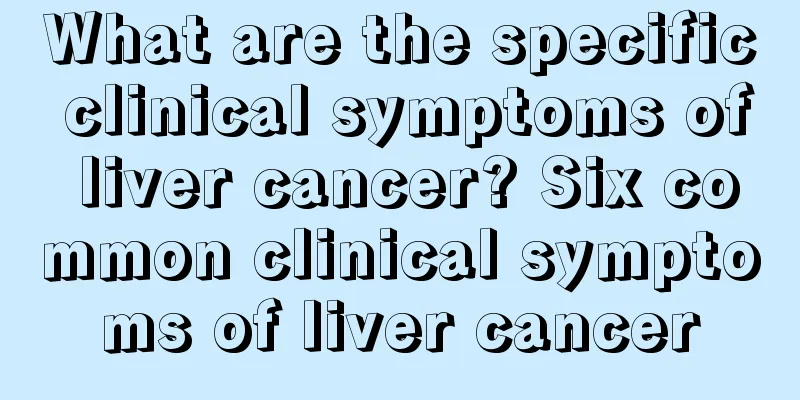What are the specific clinical symptoms of liver cancer? Six common clinical symptoms of liver cancer

|
Now the number of people dying from liver cancer is increasing. In my country, 110,000 people die from liver cancer every year, including 80,000 men and 30,000 women, accounting for 45% of the deaths from liver cancer worldwide. If the symptoms of liver cancer are discovered early and the spread of the lesions is controlled, the patient's death time can be effectively delayed. So, what are the specific clinical symptoms of liver cancer? Let's introduce them to you. The six major clinical symptoms of liver cancer: 1. Pain in the liver area: The most common is intermittent and persistent dull pain or distending pain. The rapid growth of the cancer causes the liver capsule to tighten, causing the tumor to invade the diaphragm and cause pain, which can radiate to the right shoulder or right back; tumors growing to the right back can cause right waist pain; sudden severe abdominal pain and peritoneal irritation signs indicate that the cancer nodule is bleeding under the capsule or rupturing into the abdominal cavity. 2. Gastrointestinal symptoms: decreased appetite, indigestion, nausea, vomiting and diarrhea are easily ignored due to lack of sex specificity. 3. Fatigue, weight loss, and general weakness. A few patients in the late stage may be cachectic. 4. Fever: Generally, it is a low fever that occasionally reaches above 39°C, presenting as continuous fever or low fever in the afternoon or remittent high fever. Fever is related to the absorption of necrotic products of the tumor. Compression or invasion of the bile duct by the tumor may cause biliary infection. 5. Symptoms of metastatic lesions: There are corresponding symptoms at the site of tumor metastasis, which sometimes become the initial symptoms of liver cancer. For example, metastasis to the lungs can cause cough and hemoptysis; pleural metastasis can cause chest pain and bloody pleural effusion; embolism of the pulmonary artery or branches can cause pulmonary infarction, which may cause sudden severe dyspnea and chest pain; blocking the inferior vena cava by the tumor thrombus may cause severe edema of the lower limbs, and even a drop in blood pressure; blocking the hepatic vein may cause Budd-Chiari syndrome, and may also cause edema of the lower limbs; metastasis to the bones may cause local pain or pathological fractures; metastasis to the spine or compression of the spinal nerves may cause local pain and paraplegia, etc.; intracranial metastasis may cause corresponding localization symptoms and signs, such as intracranial hypertension, which may lead to brain herniation and sudden death. 6. Other systemic symptoms: Endocrine or metabolic syndromes caused by abnormal metabolism of the tumor itself or various effects of cancer tissue on the body are called paraneoplastic syndromes, which may sometimes precede the symptoms of liver cancer itself. Common ones include: (1) Spontaneous hypoglycemia: 10-30% of patients may experience this syndrome due to the ectopic secretion of insulin or insulin-like substances by liver cells, or the inhibition of insulinase by tumors, or the secretion of a pancreatic β-cell stimulating factor, or excessive glycogen storage; it may also be caused by excessive glucose consumption by liver cancer tissue. Severe cases may cause coma, shock and death. Correct judgment and timely symptomatic treatment can save patients from death. (2) Polycythemia: 2-10% of patients may experience related symptoms that may be caused by increased erythropoietin in the circulation. (3) Other rare symptoms include hyperlipidemia, hypercalcemia carcinoid syndrome, early sexual and gonadotropin secretion syndrome, cutaneous porphyria and dysfibrinogenemia, which may be related to abnormal protein synthesis, ectopic endocrine secretion and porphyrin metabolism disorders in liver cancer tissue. Liver cancer patients should not be discouraged. As long as they actively cooperate with the doctor's treatment and pay attention to their diet, they can slowly recover. |
Recommend
Can lung cancer cause fever? It's possible
Lung cancer patients may have a fever. First, can...
What are the characteristics of chronic active hepatitis
Chronic active hepatitis, also known as type B ch...
What foods can help you quit smoking?
Everyone knows that smoking is harmful to health....
What symptoms will lung cancer patients have? If three symptoms appear, beware of lung cancer
When the tumor blocks the bronchus, there is ofte...
Is Yifan Fengshun Flower poisonous?
Because the name of the smooth sailing flower is ...
What are the symptoms of intestinal tuberculosis?
Intestinal tuberculosis is actually a chronic int...
How can I relieve the pain of tooth decay?
People often refer to tooth decay as caries. Many...
Common home care for patients with teratoma
Teratoma is a common tumor disease. It often occu...
Prostate cancer radiotherapy pain, a few minutes each time
Prostate cancer radiotherapy pain, each time for ...
How to make paper cup bread in the oven
Bread is a very common dessert in our lives. Spea...
Can eating pears on an empty stomach help lose weight?
Pear is a nutritious fruit with high medicinal va...
What to do if you have a headache due to insufficient Qi and blood
Many women often suffer from insufficient qi and ...
Is it better for pregnant women to lie down or sit?
In the middle and late stages of pregnancy, the p...
What foods can strengthen the spleen, stomach and kidneys?
Recently, many people's spleen and stomach ar...
Can attention deficit heal itself?
Attention deficit disorder is a mental disorder t...









